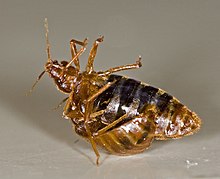
Traumatic insemination, also known as hypodermic insemination, is the mating practice in some species of invertebrates in which the male pierces the female's abdomen with his aedeagus and injects his sperm through the wound into her abdominal cavity (hemocoel).[1] The sperm diffuses through the female's hemolymph, reaching the ovaries and resulting in fertilization.
The process is detrimental to the female's health. It creates an open wound which impairs the female until it heals, and is susceptible to infection. The injection of sperm and ejaculatory fluids into the hemocoel can also trigger an immune reaction in the female. Bed bugs, which reproduce solely by traumatic insemination, have evolved a pair of sperm-receptacles, known as the spermalege. It has been suggested that the spermalege reduces the direct damage to the female bed bug during traumatic insemination. However experiments found no conclusive evidence for that hypothesis; as of 2003, the preferred explanation for that organ is hygienic protection against bacteria.[2]
The evolutionary origins of traumatic insemination are disputed. Although it evolved independently in many invertebrate species, traumatic insemination is most highly adapted and thoroughly studied in bed bugs, particularly Cimex lectularius.[1][3] Traumatic insemination is not limited to male-female couplings, or even couplings of the same species. Both homosexual and inter-species traumatic inseminations have been observed.
- ^ a b Arnqvist, Göran; Rowe, Locke (2005-07-05). Sexual Conflict (Monographs in Behavior and Ecology). Princeton, NJ: Princeton University Press. pp. 87–91. ISBN 978-0-691-12218-2.
- ^ Cite error: The named reference
reinhardtwas invoked but never defined (see the help page). - ^ Carayon, J. (1966). "Paragenital system". Monograph of Cimicidae (Hemiptera, Heteroptera). College Park, MD: Entomological Society of America. pp. 81–166. ISBN 978-0-9776209-2-0.